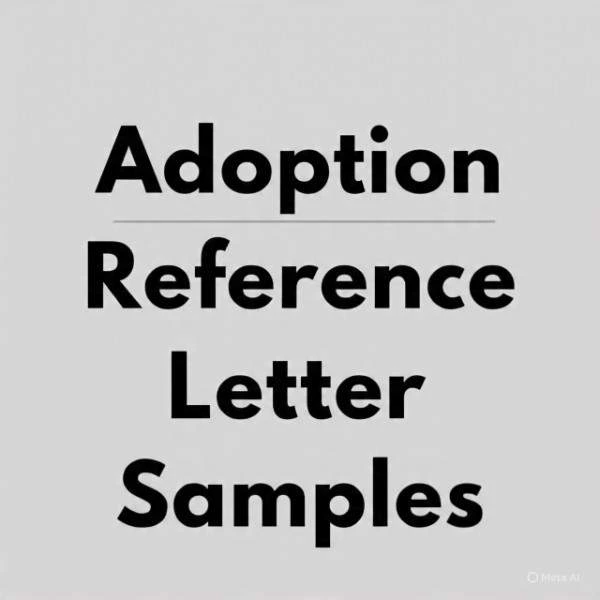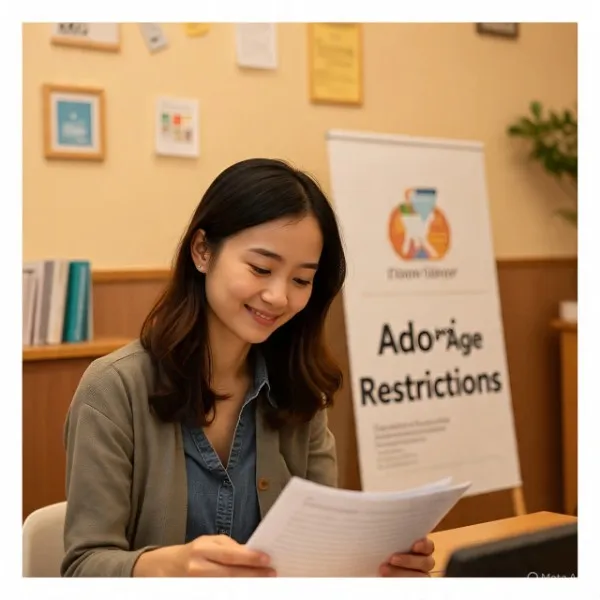3 Killer Adoption Reference Letter Samples To Copy Now

Are you looking for adoption reference letter samples to learn from? I have got you covered, just be ready to thank me after reading this post.
You’ve just received a call from a dear friend, colleague, or family member requesting that you write a reference letter for adoption. Suddenly, you’re looking at a blank page, your mind wandering about how your words can capture why they are eligible to be parents.
To assist you, we have compiled some adoption reference letter samples that can guide you in crafting your own.
The weight of responsibility feels astounding. What if you write what can jeopardize your friend’s chances? What if your letter isn’t compelling enough? What if the agency questions your credibility?
Finding the right adoption reference letter samples can seem impossible when you are under pressure to write a top-notch reference letter. According to the National Center for Health Statistics, more than 135,000 children are adopted in the United States yearly, with prospective adoptive parents required by the agencies to submit a character reference as part of their home study process.
Your letter would not just support an application, but would also help create families and change lives forever.
The adoption process has increased significantly in 2025, but agencies have placed greater emphasis on authentic and detailed character testimonials to help them understand the prospective parents’ capabilities. The truth is that surface-level references are not acceptable in today’s competitive adoption landscape.
Agencies now require Letters that provide certain details, demonstrate a long-term relationship, and provide insights into how the applicant communicates, navigates stress, and nurtures relationships.
In this comprehensive guide, I will equip you with all you need to write an adoption reference letter that will be acceptable to the agencies, birth parents, and social workers. I will show you proven adoption reference letter samples, real-world reference letter templates, and expert insights from adoption experts to guide you.
Whether you are writing for a family member, close friend, or colleague seeking to adopt a child, you will learn to craft a reference that makes a difference from these adoption reference letter samples I will show you.
Understanding the Critical Role of Adoption Reference Letters in 2025:
Adoption reference letters are one of the main requirements during the home study process. It provides third-party validation of prospective adoptive parents’ stability, character, and parental abilities.
Unlike job references that only focus on the professional skills, an adoption reference letter must paint the best picture of the individual prospecting to be a future parent and family builder. You will see examples in some of the adoption reference letter samples I will show you in this post.
This is necessary because nowadays, adoption agencies have become progressively sophisticated in their adoption evaluation processes, and you need to move with the changes.
Recent data from the Child Welfare Information Gateway shows that almost all agencies require between three to six reference letters these days, per adoption application, and specific requirements for different types of relationships.
These reference letters are very crucial in the decision-making process, and often serve strike tie-breakers for all the qualified families. The best adoption reference letter samples must demonstrate that you have some important knowledge of the applicants’ relationship, way of life, and responses to challenges.
In 2025, the adoption of evaluation practices introduced certain considerations for reference writers. With the evolution of open adoption, where birth families actively participate in choosing adoptive families, reference letters can be shared with expectant mothers even before considering placements.
This new introduction means that your reference letter should be able to influence not just the agency approval, but the birth family selection too, which has added another layer of responsibility for you, as you will see in the adoption reference letter samples I selected for you.
According to Sarah Martinez, a licensed social worker with 15 years of adoption experience, “the most impactful reference letter must come from people who have seen the applicants in different situations, including stress, celebration, conflict resolution, and other everyday interactions. “We are looking for evidence of emotional maturity and genuine love for children.”
The landscape surrounding adoption has also affected the reference letter requirements. Many states now require that the reference provider must include their relationship duration with the applicant, sworn statements about their observation accuracy, and contact information for verification. This is to ensure accountability, as well as protect the adoption triad.
Understanding these adoption reference letter requirements will help you to write reference letters that meet all standards and authentically represent the prospective parents you are backing.
The stakes are high, but there’s no need to panic. With good preparation and closely studying the adoption reference letter samples I will show you, you can play the best role in helping your friend achieve their dreams of parenthood.
Essential Components Every Adoption Reference Letter Must Include:
To write a compelling reference letter, you must follow a specific format, as you will observe in the selected adoption reference letter samples. That will allow you to address the crucial areas of concern for adoption professionals. Each of these components serves a clear purpose in presenting the picture of the adoptive parents’ readiness and eligibility for adoption.
In the first paragraph of the letter, you establish your credibility and relationship with the applicant. This includes your full name, the nature and duration of your relationship with the adoptive family, and your profession.
The agencies want to assess the reliability of your observation and to understand your perception. For example, a neighbor of 7 years will give different ideas than a college roommate or colleague at work. You will understand this well when you review any adoption reference letter samples.
Another important part of the letter is the body. It must address other critical areas systematically.
In the body of your adoption reference letter, you should address all the critical areas systematically. The character assessment form is the foundation; it will cover traits like the applicant’s emotional stability, honesty, and integrity.
You are needed to provide specific examples that will show these qualities in action and not simply list the adjectives, as provided for you in the adoption reference letter samples.
For example, “Michael is reliable, doesn’t have a big weight, than Michael is always committed to helping in Sunday school and staying late to ensure every child is properly taken care of.
Parenting potential, financial stability, and relationship dynamics between the couples pursuing the adoption must be fully captured in your reference letter, and they all desire special attention if your letter should capture the attention of the agency.
The agencies want evidence of strong communication, shared values, and problem resolution skills. So describe how you have witnessed them tackle disagreements and support each other during challenges and make decisions together.
This information will help the agency understand the environment they will enter and the support system available.
Your closing paragraph must have a strong endorsement statement, your information for follow-up questions, and you must be very willing to provide additional information when needed. Check the adoption reference letter samples below for ideas.
Professional Colleague/Employer Template:
[Date]
[Agency Name and Address]
Re: Character Reference for [Full Names of Applicants]
Dear Adoption Professional,
I am delighted to provide my full recommendation for [Names] as they pursue adoption. I have had the pleasure of [Name] as [Title] at [Company] for [time], and I can comfortably attest to their excellent character, professional competence, and personal qualities that will make them outstanding parents.
I have also witnessed how [Name] works under pressure. I found this out during our recent project deadline crisis. [Name] was remarkably patient in coordinating with upset clients, which finally resolved the situation through tenacious, top-notch communication styles. This same ability of patience and problem-solving proved their ability to be wonderful parents.
[Integrity] of [Name] is beyond reproach. When they were faced with an ethical dilemma concerning client confidentiality last year, they did the more difficult but ethically correct thing, even when it might entail personal consequences. This type of commitment to doing the right thing at any personal cost is the type of moral fiber that any child would need in a parent.
I’ve had numerous opportunities to observe [Name] interact with children during company family functions and volunteer activities. Their natural ability to connect with children of any age is remarkable. I watched them devote an entire afternoon to patiently teaching my shy seven-year-old daughter how to ride a bike at our company picnic, encouraging her with sincere enthusiasm over minor accomplishments.
On a practical level, [Name] exhibits very good financial responsibility and long-term planning. They have been twice promoted throughout our working relationship, consistently receive outstanding performance reviews, and have made it abundantly clear that they have career goals that are commensurate with providing solid support for a family.
I strongly recommend [Names] for adoption without hesitation. They possess the character, stability, and love necessary to provide a child with an excellent home. Do not hesitate to contact me at [phone] or [email] if you need additional information.
Sincerely, [Your name, title, contact information]
Close Personal Friend Template:
The personal reference from a friend offers day-to-day, close-up details regarding relationships, life, and character that professional references cannot equal. The samples of adoption reference letters here should emphasize emotional intelligence, interpersonal relationships, and parenting observations from socialization.
Begin by expressing how well you know the prospective parents and the shared experiences that have revealed their character to you. Provide clear explanations of situations in which you’ve witnessed them manage stress, interact with others, and demonstrate nurturing abilities.
Explain everything you’ve noticed about their home life, and mostly how they welcome others into their space.
Family Member Template:
Family members provide a unique historical perspective and knowledge of generational trends, values, and long-term relationship patterns within a family. These adoption reference letter samples should address their childhood, family relationships, and their development as adults while still being considerate of boundaries when it comes to private family information.
Highlight their position within the extended family, how they get along with the other children in the family, and their verbalized willingness to uphold family values and traditions. Avoid mentioning family conflicts or personal problems that would cause unnecessary questions about family stability.
Each adoption reference letter sample template has to be customized with personal details and particular examples that reflect your actual relationship with the prospective parents. Generic adoption reference letter samples that could apply to anybody will not serve their adoption goals very effectively.
Common Mistakes That Weaken Adoption Reference Letters and How to Avoid Them:
It is important that you understand what to include in your adoption reference letter and what not to include in it. Many writers unknowingly weaken their letters with little mistakes, which dilute their message impact and make the adoption professionals raise eyebrows.
1) Writing With Genetic Styles:
The most common error is writing a generic template-style letter that could apply to everyone. Many wrongly written adoption reference letter samples use phrases like Annie and John would make great parents, or they love children.
The statements did not provide any useful information to agencies to help them understand your referrer.
Instead of writing that Annie is kind and caring, talk about the situation where you have seen her exhibit her kindness, such as how she helped someone in her neighborhood take care of the child so the mother could attend to other pressing needs.
2. Inappropriate Disclosure of Personal Information:
While meaningful insights are necessary, it is not appropriate to share private medical information, financial details, family secrets, or your relationship challenges, especially when the applicant doesn’t want them disclosed.
Doing that will violate their trust and create irrelevant concerns for agencies. Concentrate on observable characters and behavioral traits rather than confidential information. Yours is to highlight what you have personally observed about their parenting abilities, character, and not to expose their private matters that could harm their application.
3. Using Overenthusiastic Language:
Using more superlative words like “perfect,” “never makes mistakes or always patient” in your reference letter will make the letter seem unrealistic and vague. Adoption professionals are aware that no one is flawless and above mistakes.
Instead, acknowledge the applicants’ normal human qualities, like their ability to take good care of children and their strength.
For example, write “While Sue gets frustrated with technology, she always seeks help when needed, and she also approaches learning new skills with patience and humor.” Using balanced perspectives is always more credible and trustworthy.
4. Failing to Address Potential Concerns:
Don’t forget to include their known challenges like job loss, family stress, and infertility, and focus focus the abilities of the applicant to handle difficulties with resilience, seek support when necessary, and become stronger after that.
Agencies love it when references acknowledge reality and demonstrate the applicant’s ability to overcome challenges.
Demonstrate how they have learned from their challenges and build coping strategies. This approach shows maturity and gives agencies confidence in the prospective parents’ problem-solving abilities.
5. Length Mistakes (Too Short or Too Long):
Writing a very short reference letter may not be good, as it shows a lack of knowledge or enthusiasm about the applicant. On the other hand, overly lengthy letters may go out of context and may not be read completely.
I suggest you aim at writing 1-2 pages of essential content that is of the readers’ interest throughout. Let every one of your paragraphs contribute healthy information rather than repeating previous points in another way.
The quality of your letter is what matters, not the length. So let each of the sections expand on the one before, to create a comprehensive image of the applicant without irrelevant repetition.
6. Timing Errors:
Start writing the letter immediately after studying these adoption reference letter samples, and do not wait until the last minute to do that, as rushing it often contains mistakes and misses important details.
Comparably, don’t write it too far in advance, because agencies want current perspectives about the applicant and their readiness for adoption. Start planning it on time, so you will have enough time for thoughtful revision and proofreading.
Aim to write the letter with fresh perspectives and ensure that your observations reflect your fresh interactions with the applicant.
7. Poor Professional Presentation:
Choose your words appropriately, because words have power. Be careful of grammatical mistakes, spelling errors, and unprofessional formatting, as they may not only undermine your credibility but also distract from your message.
Use, business letter format and proofread it carefully. Use Grammarly writing App for mistakes and grammatical errors. You can also have another person help you review the letter again before submission. A quality presentation will enhance the overall impact of your recommendation.
8. Including Information That Raises Unnecessary Concerns:
Don’t make the mistakes of mentioning topics like past relationships, addiction, and financial struggles unless they are directly necessary to show positive character growth.
Never forget that your goal is to provide a comprehensive applicant’s history that will help them achieve their dreams. Focus on information that will strengthen the application and not introduce red flags.
Let every detail you provide serve the purpose of proving your referee’s readiness and sustainability for parenthood.
# Taking Action: Your Next Steps to Writing a Powerful Adoption Reference Letter

Now, you have finished studying the adoption reference letter samples selected for you and other information provided, it is time to write your adoption reference letter. Understand that each delay extends the applicants’ dream to parenthood and may hinder meeting important deadlines, too.
Draft an outline now using the ideas you provided for you on the selected adoption reference letter samples, and start writing. Make effective use of those given samples as inspiration, yet make your letter personal and top-notch, because agencies can tell the difference between authentic letters and generic copies.
Spend dedicated writing time without distraction. Budget for several drafts and read out loud to achieve a natural sound. Have a trusted colleague review the letter for clarity while ensuring confidentiality.
Turn it in on time to avoid being the holdup in their process. Your letter is part of a child’s narrative, chronicling the journey that led them home.
Act now. Families are waiting, and your powerful letter of reference can make life-changing connections. Your voice matters, so start writing now.
Q 1. How long should an adoption reference letter be?
A. Well written adoption reference should be from 1-2 pages of single-spaced text, that provides enough detail about your referee, and be meaningful without becoming overwhelming.
Agencies need substantial information to make informed decisions, but extremely lengthy letters often lose focus and impact. Aim for approximately 600-800 words that maintain reader engagement throughout.
Q 2. What if I don’t have children myself?
If you don’t have parenting experience, it doesn’t disqualify you from writing a powerful adoption reference letter. Concentrate on all the character traits of the applicant, their relationship skills, and how they interact with children that you have observed.
Many exceptional references come from single friends, colleagues, or mentors who offer valuable perspectives on the applicants’ character and potential.
Q 3. Should I mention any of the applicants concerns or weaknesses in the adoption reference letter?
Avoid highlighting significant flaws or concerns that could jeopardize the adoption application. However, you can acknowledge normal human qualities or show growth from past challenges.
The most effective adoption reference letter examples find ways to address minor weaknesses while demonstrating personal development and resilience.
Q 4. How personal should I get in an adoption reference letter?
Just try all you can to have a good balance between meaningful insights and appropriate boundaries.
Don’t forget to talk about all your personal observations about character, relationships, and parenting-related behaviors, but avoid sharing private medical information, or confidential family matters unless the applicants have specifically asked you to address these topics.
Q 5. What’s the difference between adoption reference letters for domestic versus international adoption?
The differences between the two types of adoption is that when writing international adoption references, you will need to address cultural adaptability, travel experience, and openness to different parenting approaches, etc.
Some countries have specific things they require to see in the reference letter content, to be on the safe side, I will advise that you the adoption agency in your area about any special considerations.
Q 6. Can I write a reference letter if I’m related to the applicants?
Yes, you can certainly write adoption references for your family member, though agencies prefer to have a mix of family and non-family member write the reference letter, so the can get well-rounded perspectives.
However, your references should be on all you know about their character, relationship with their family, and interactions with children rather than simply expressing family loyalty.
Q 7. Should I contact the adoption agency directly before writing the letter?
This isn’t necessary unless you have specific questions about their requirements.
However, asking the applicants about any particular areas the agency wants addressed can help you focus your letter more effectively. Some agencies provide reference letter guidelines that can inform your writing approach.
Q 8. How recent should my observations be?
While you can reference historical events that demonstrate character, be that your letter describes all your current knowledge of the applicants.
Agencies want to understand who these people are now, not just who they were years ago. Include recent examples and current contact with the prospective parents.
Q 9. What if I’m asked to write multiple reference letters for the same couple?
Each letter should be unique and written to the specific agency’s requirements. While your core message about the applicants’ character will remain consistent, successful adoption reference letter examples vary their examples and focus areas to provide fresh perspectives for different agencies or programs.




